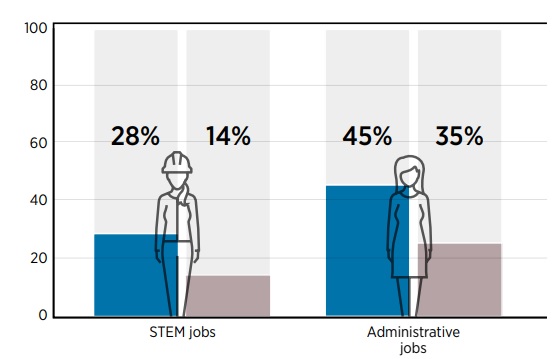08 Mar 2021
International Women’s Day: Male sovereignty in the energy sector
There will be no massive demonstrations as in previous years, but the feminist movement does not give up on taking the streets. Throughout the planet, rallies and activities will be carried out, respecting security measures to celebrate International Women’s Day, a designated date on which thousands of women claim a right set in the Universal Declaration of Human Rights: equality.
This celebration, formalized by the United Nations in 1975 with the purpose of recognizing and making visible the years of combat in favor of equality, justice, peace, emancipation and the development of women in all areas of society, is linked to feminist movements during the Russian Revolution of 1917.
Despite the fact that International Women’s Day has been celebrated for decades, the long-awaited equality between men and women has not yet been achieved. We only have to look women’s representation in the energy sector.

The report carried out in 2019 by the International Renewable Energy Agency (IRENA), entitled ‘Renewable Energies: a gender perspective’, analyzes the state of participation of women in the renewable energy sector. One of the results that the document highlights is that there is gender inequality in terms of the female presence, which occupies 32% of jobs in renewables.
In addition, as in other fields, women’s participation in jobs related to science, technology, engineering or mathematics (STEM) is far less than their presence in administrative jobs, 28% compared to 45 %. These results show that there is still a lot to do to reach real equality.
It should be noted that the lack of data disaggregated by gender in each of the renewables makes it difficult to know the percentage of women the biomass sector, both nationally and internationally.
On the other hand, Spain is still far from achieving equality. According to the ‘Observatory on the role of women in the energy sector companies 2018’, prepared by Aemener, only 28.5% of the workforce of companies in the energy sector are women. Likewise, as reported by Red Eléctrica, the salary gap in Spain is 22%, while in the energy sector companies it is 18%.
Did you know…?
For a long time, the field of science has been forbidden to women, so it’s no wonder they have had a hard time making their way in this area. This was the case of the Romanian Elisa Leonida Zamfirescu, who was the world’s first female engineer. She graduated in 1912 from the Technical University of Berlin after being rejected as a female student at the Bucharest Polytechnic.

What about Spain? Taking into account that the national territory is always one step behind Europe, one might think that the first female Spanish industrial engineer graduated after the end of the Franco regime. Nothing could be further from the truth.
It was in 1929, during the Second Republic, when Pilar Careaga, known for having been mayor of Bilbao between 1969 and 1975, graduated from the current Polytechnic University of Madrid.
Like Zamfirescu and Careaga, many women throughout history have had to work hard to achieve the recognition they deserved and become the role models of the sector. This is the case of Lucia Galvani, Herta Marks Ayrton, Edith Clarke and Maria Telkes, among many other female figures to whom today, on International Women’s Day, we pay tribute.
